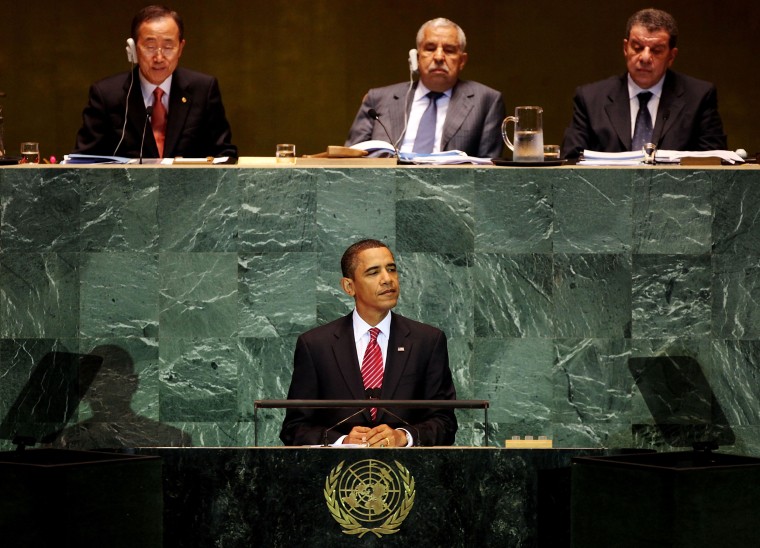When President Barack Obama addresses the United Nations General Assembly on Tuesday for the eighth and final time as commander-in-chief he will highlight how his tenure in office has been marked by increased economic security and safety.
It's an important message for a White House anxious to show the administration has made significant progress over the course of Obama’s presidency on such issues as climate change and advocating for democratic freedoms — some of the issues that will define his presidency. It is also a message that will underscore that, despite the progress, challenges remain as the world grapples with the continued rise of ISIS and impact of global terrorism and warily eyes North Korea's nuclear ambitions.
Deputy National Security Advisor Ben Rhodes pointed to the two international deals for climate change and Iran nuclear nonproliferation, along with strengthening the United Nations as highlights of the president's efforts.
“I think it's hard to overstate the transformative effect that this approach has had,” U.S. Ambassador to the United Nations Samantha Power told reporters about international cooperation.
Power said she’s experienced a “sea change” when it comes to other countries wanting to work with the U.S. and pointed specifically to the Iran nuclear deal and the United Nations peacekeeping effort.

President Obama had just been in office nine months when he gave his first address to the U.N. in 2009. He pledged to begin “a new chapter of international cooperation” after many around the world viewed America with “skepticism and distrust.”
The first-term president offered ambitious plans to rid the world of nuclear weapons, confront climate change, defeat al Qaeda and its allies and pointed to his first day in office where he ordered the prison at Guantanamo closed.
While the administration can point to successes on climate and nonproliferation, and the killing and capture of Osama bin Laden, there are new and changing issues dominating the globe.
The rise of ISIS and and ISIS-inspired attacks have spread from an unstable Middle East to Europe and the U.S.
The prison at Guantanamo remains open, though only 61 prisoners remain.
There are new concerns over an emboldened Russia after it annexed Crimea.
The civil war raging in Syria shows no signs of stopping. A fragile ceasefire brokered between the U.S. and Russia to stop the violence and deliver humanitarian aid to Syrian appeared to crumble Monday.
Many of the meetings at the U.N. will focus on Syria.

Tuesday, the president will also chair a summit on refugees at the U.N. It’s a pivotal issue considering 65 million people have been displaced across the globe, the largest number since World War II.
The U.S. has pledged to increase the number of refugees it takes in from Syria next year to 110,000.
The president will also meet individually with Prime Minister Haider al-Abadi of Iraq, Israeli Prime Minister Benjamin Netanyahu, Premier of China of Li Keqiang, President Muhammadu Buhari of Nigeria and Colombian President Juan Manuel Santos.
The White House hopes to apply the same diplomacy strategies it used to negotiate the Iran nuclear and Paris climate deals to address the new crises that have arisen.
“Frankly, if we demonstrate that same commitment to working with other countries, but also standing up for the things that we believe in, we'll be in a better position to deal with the challenges we face today,” Rhodes told reporters.